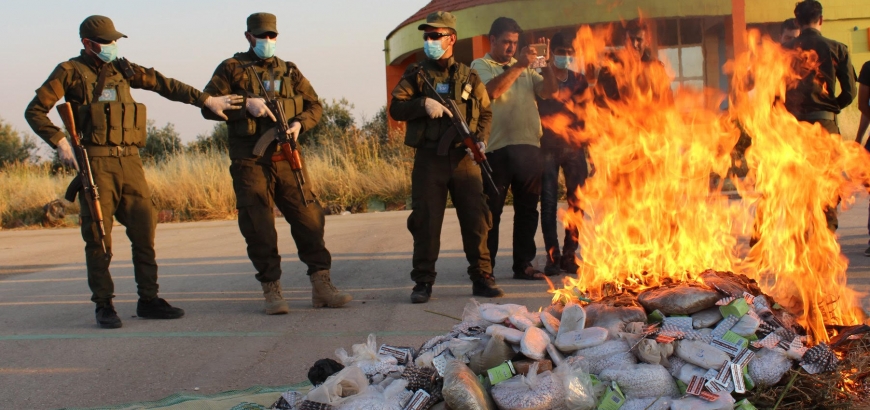Alaa Eddin, an owner of a cafe in Hassakeh, told Alsouria Net that, “some young men who frequent the cafe have been emptying out the ma’asal tobacco from the heads of the argileh that we prepare in the cafe, and then in its place put something they try to say is special ma’asal they prefer. Sometimes they bring their own pre-prepared argileh heads, and later signs of bliss appear on their faces.”
The owner of a shop in Qamishli who asked not to be named told Alsouria Net that he had noticed, “young men and teenagers asking to buy Syrian-made Hamra tobacco, which is favored by drug users, as they take out the tobacco and mix it with drugs.”
The spread of drug use and dealing among young people in various parts of Self-Administration-controlled areas is not new, but it has begun to increase in the last few years, and the last few months.
On the occasion of the International Day Against Drug Abuse on Jun. 26, 2019, the Self-Administration announced it had confiscated more than 158 kg of hashish and other forms of drugs in the areas it controls in northern and eastern Syria.
The relatively large number indicates the extent that drug dealing and trafficking has spread. The anti-organized crime forces in the Self-Administration said that they had confiscated these volumes in Hassakeh province over the last year, as well as saying that they had “arrested about 50 people including drug dealers and traffickers.”
The gradual spread of trafficking in hashish and drugs in northeastern and eastern Syria goes beyond the limits of a phenomenon, and became prominent after the Syrian Democratic Forces (SDF) took control over most areas from the Islamic State, especially the city of Raqqa and Deir ez-Zor province, according to data.
The Self-Administrations’s internal security forces—the Asayish—have announced that they have destroyed quantities of confiscated drugs, but without revealing the sources of these substances or how they reached the area. The Administration’s judicial agencies have not announced any long sentences against people involved in these operation amid a stream of accusations against its security and military agencies of “intentional dereliction” and “negligence.”
Rudy Awso, a journalist, speaking this week to Alsouria Net, accused judicial and security agencies of “appeasing traders and drug dealers and not issuing deterrent sentences against those they arrest.” He noted that pharmacies in Hassakeh refrained from operating at night, “out of fear of drug addicts who sometimes roam around looking for medicine to ease the state of addiction they’ve fallen into, and then sometimes threatening them with weapons.”
The journalist Humberfan Koussa told Alsouria Net that the phenomenon was spreading and had increased over the last few years and that, “we can consider this normal in the context of war, revolution and chaos,” and noting that three years ago, “farmers in the Hassakeh countryside turned their land from growing wheat and barley to growing hashish.”
Koussa added that the decline in the role of the family and the absence of monitoring from parents had “contributed greatly to the growth of this phenomenon, keeping in mind that the some traders have taken positions in these militias and that this is a profitable trade for them.”
This article was translated and edited by The Syrian Observer. Responsibility for the information and views set out in this article lies entirely with the author.


